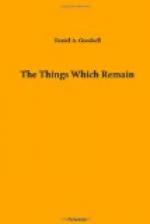[Footnote 2: Cf. Denney.]
[Footnote 3: Cf. Denney.]
[Sidenote: Natural Ethical Canon.]
Yet, let us remember that below this Christian consciousness lie the substrata of reason and ethical canon common to all men. Religious truth rests on these in its first revelations. Above the first and simplest revelation, truth rests on Christian experience as to those matters for which reason and natural ethical canon are insufficient.
[Sidenote: General Calm of Methodist Episcopal Church.]
[Sidenote: Wesley’s Advanced Views.]
This having been the teaching of the Methodist Episcopal Church from the beginning, she has been little disturbed by the critical school. While holding that the Bible is the sole rule of faith, she has not committed herself to any one theory of inspiration. She has not believed the Scriptures because they are written, but, being written, she has found them true. She has believed in the supernatural power of the Gospel because in her sight its leaven has wrought in the individual and in society what it claims for itself. John Wesley believed that there were God-breathed teachings outside of the Bible. He believed this because of his feeling that the Divine Fatherhood must have spoken to other than His Jewish children. Inheriting from our founder these thoughts, we have kept a high degree of calm in these later days of inquiry and doubt.
[Sidenote: Wide Range of Unbelief.]
[Sidenote: Natural Immortality.]
[Sidenote: Reward and Punishments.]
We have already admitted that the present tendency to unbelief has wider range and fresher foundations than our fathers knew. The belief in the natural immortality of the human soul whether of Platonic or Christian origin is shaken to an extent not known in a century. The doubts of Huxley, the denials of Haeckel had a purely scientific basis. The suspension of consciousness by sleep, by accident, by drugs, the decay of mind by old age and by disease are freely put forth as proofs that mind can not exist without the mechanism which supports and manifests it. If this last be true a doctrine fundamental to Christianity must be abandoned. The doctrine of immortality through Christ does not meet the new objections. The scheme of redemption and the doctrine of future rewards and punishments are involved in the fate of the doctrine of natural immortality. We have thus shadows of doubt thrown upon two great doctrines, the virgin birth of Christ and natural immortality. The miracles, Resurrection, and Ascension must be added to the shadowed list.




